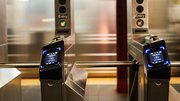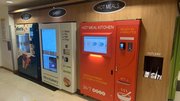Vending
Coin shortage: both burden and benefit for vending
While the coin shortage caused by COVID-19 has inconvenienced some self-service equipment operators, others believe it has exacerbated the consumer’s adoption of cashless payment, a change most operators welcome due to the cost of handling cash.

July 22, 2020 by Elliot Maras — Editor, Kiosk Marketplace & Vending Times
Location closures, safety concerns and inconvenient new protocols aren't the only issues complicating life for vending and amusement machine operators during the coronavirus pandemic.
A nationwide coin shortage caused by consumer hoarding and restricted activity by the U.S. Mint has brought additional burdens, as well as some benefits. The shortage has made it difficult for some operators to provide change customers expect, while others believe it has exacerbated the consumer's adoption of cashless payment, a change most operators welcome due to the cost of handling cash.
Random interviews with vending and amusement operators found the extent of the shortage varies by region and the degree to which customer locations have been affected by COVID-19 lockdowns.
Many operators have not yet been affected, although this could change if the shortage continues.
Coin shortage arises
In the past few months, coin deposits from banks to the Federal Reserve have declined "significantly," the central bank reported, while the U.S. Mint's production of coins also decreased due to measures put in place to protect its employees from the coronavirus. Coin orders from depository institutions have increased as regions reopen, resulting in the Federal Reserve's coin inventory being reduced to below normal levels.
On June 15, Federal Reserve Banks began to allocate available supplies of coins to depository institutions as a temporary measure.
The central bank also formed a task force to identify, implement and promote actions to reduce the consequence and duration of COVID-19 related disruptions to coin circulation. The recommendations of the task force, which includes the U.S. Mint, the American Bankers Association, the Independent Community Bankers Association, the National Association of Federal Credit Unions, the retail industry and others, are due at the end of July.
Impact on operators varies
Meanwhile, for many convenience services operators, the COVID-19 lockdown that caused the shortage has also negated the need for change in customer locations for the time being.
"I haven't seen any impact yet," David Sours, vice president of off-premise for Birmingham, Alabama based Coca-Cola Bottling Co. Inc., which operates about 50,000 vending machines in seven Southeast states, told this website. "In the channels that do most of my volume, nobody's in those channels anyway. Everybody's working remotely now, and education's out." At the present time, the company's vending volume is down 40% over last year.
When people do return to work, Sours believes the coin shortage will be blunted by the cashless payment options on most of the company's machines.
Food Express, a convenience services operation in Greensboro, North Carolina, has shut off its coin mechs due to the unavailability of coins, said Billy Whitacre, co-owner and senior vice president of operations.
Whitacre doesn't fully regret the move, as it has allowed him to remove dedicated bill changers in some accounts. "I didn't want that money sitting there," he said.
Like most operators interviewed, Whitacre also believes the growth of cashless acceptance and micro markets in recent years has softened the coin shortage's impact on his business.
"It hasn't really hit yet, but we've been told it's coming," said Steve Hall, vice president of operations at Firelands Vending in Sandusky, Ohio. Local banks continue to provide coins every week when the company makes its deposits, but the banks have warned that supplies could be restricted.
The worst scenario for Firelands Vending would be a shortage of dollar coins to stock the machines with since there aren't enough dollar coins paid into the machines to meet the need for change. "We run a deficit on the number that we get back versus what we get from the bank," Hall said.
In the event there aren't enough dollar coins to put in the coin changer, the company would have an extra tube of quarters, Hall said.
Some customers are wary of taking change because of the coronavirus, Hall said. In response, the company has removed cash from those locations.
Dollar coins affected
Dollar coins are already an issue for Five Star Food Service Inc. in Chattanooga, Tennessee. Like Firelands Vending in Ohio, officials at Five Star Food Service feel they get enough lower denomination coins from customer payments to provide the amount needed for change, but not enough dollar coins.
"Over time, I'm sure it (the shortage) will be an issue, given what the Federal Reserve and U.S. Mint have put out," said C.J. Recher, vice president of marketing at Five Star Food Service.
Recher said the company will post notices on its card reader screens to advise customers if coins are not available.
Dependable Vending in Upland, California has been struggling to get coins for nearly a month, said Zachary Oliver, company vice president. The company has had to turn off the coin mechs at some accounts.
"There are many machines that won't operate without a coin mech," he said.
The shortage is especially problematic in blue collar accounts with employees making minimum wage, Oliver said, since these customers often do not have credit cards.
"It hasn't become an issue yet," said Gaye Tankersley, president of Food Service Solutions Llc in Columbia, South Carolina. "Our bank has made us aware there is a shortage from the Federal Reserve."
Daniels Vending in Trappe, Maryland has not experienced any shortages, said Megan O'Neil, general manager, nor has the bank she deals with indicated any such expectation.
Operators fare better than other retailers
Because they receive coins in payment, operators of point-of-sale machines are faring better during the shortage than most retail businesses. In some cases, operators have actually supplied coins to other businesses.
Venco Business Solutions in Bland, Virginia, which operates amusement machines and ATMs, has provided change to some convenience stores, said company owner John Newberry.
"We've got plenty of quarters," concurred Walt Smith, owner of King Koin Amusements in Little Rock, Arkansas.
The same cannot be said for laundromats.
The Laundry Depot in Corpus Christi, Texas has eight laundromats that have historically only accepted quarters. The company does not get enough quarters in pay to provide enough change.
The bank will only provide three rolls of quarters a week, compared to 1,000 to 1,500 pre-shortage, said Michael Currie, company owner.
In response, the company recently installed PayRange BluKey devices to enable mobile app payments for 530 washer and dryer machines.
The mobile payment app takes some customer education, but customers are starting to use it, Currie said.
"The cost of not accepting cashless is now higher," surmised Paresh Patel, founder and CEO of PayRange.
For an update on how the coronavirus pandemic is affecting convenience services, click here.
About Elliot Maras
Elliot Maras is the editor of Kiosk Marketplace and Vending Times. He brings three decades covering unattended retail and commercial foodservice.
 ChatGPT
ChatGPT Grok
Grok Perplexity
Perplexity Claude
Claude






